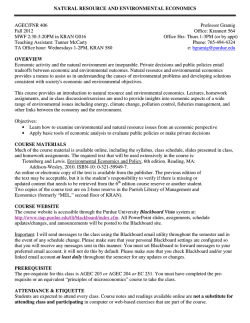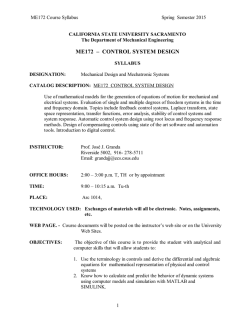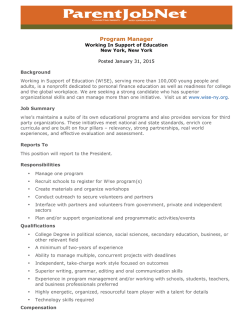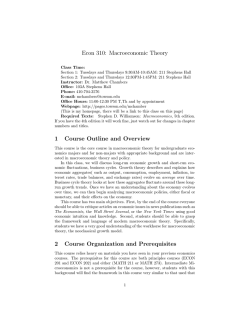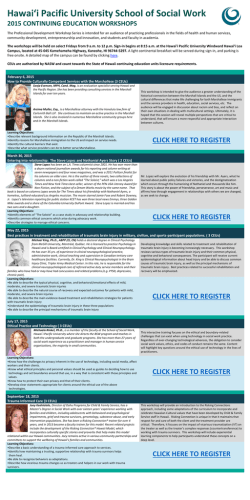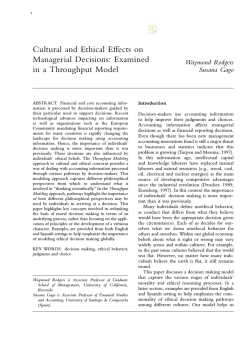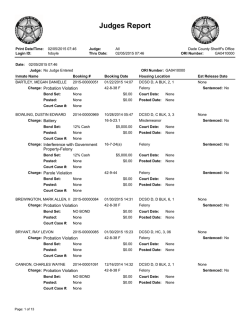
Download - Northeastern University College of Professional Studies
1 LDR 6135 The Ethical Leader, CRN 20646 Online Winter CPS Quarter, 6-week February 17 – March 28, 2015 Contact Information Instructor Name: Dr. Hernan Murdock E-mail: [email protected] Phone Number: 978-394-1626 You can access the course at http://nuonline.neu.edu/ by clicking on the course link under the "My Courses" tab. Note: Courses you are enrolled in will not show up in CPS Blackboard until the start date of the term. For computer access, the NEU library can be used 7 days a week: http://www.lib.neu.edu/ Required Textbook/Materials Cases in Business Ethics (2006) Author: David J. Sharp Publisher: Sage Publications ISBN: 1-4129-0924-4 Course Prerequisites Student Competencies: • The internet and Microsoft Word are used throughout. Students are expected to already be proficient in the use of these tools. • Students will be expected to complete several written assignments and present them in APA Paper Format. Documents describing APA format are available in the course. Course Description This course considers the conflicts that can arise when individual values conflict with those of the organization. Uses case studies and current events to examine actions leaders have taken and consequences faced when confronted with ethical dilemmas. From crises within our religious institutions to corporate fraud, our news is filled with examples of an ethical void in leadership and our society today. Citizens and employees alike are demanding that our leaders go beyond mere accountability for their actions; they’re demanding moral leadership in both our institutions and society overall. From these discussions, students have an opportunity to develop a personal model for ethical leadership. Learning Outcomes During the course, students will have the opportunity to: • Identify various factors that support and hinder ethical decision-making. • Evaluate the constructs of morality and decision-making. • Understand the implications of subjective and objective thinking. • Explore various philosophical and societal approaches to problem solving. • Analyze ethical issues in business leadership and the decisions of leaders In pursuing these objectives, the course will: • Use the text and cases 2 • • • Combine theory and practice Combine the strategic with the tactical Use relevant concepts to analyze and assess ethical situations in organizations Course Methodology Each week you will view lecture materials, read more about the lecture topic in your course text and then you will complete case studies and other assignments where you will have a chance to apply what you have learned. Each week, you will be expected to: 1. Review the week's learning objectives. 2. Complete all assigned readings. 3. Complete all lecture materials for the week. 4. Participate in the Discussion Board. 5. Complete and submit all assignments by the due dates using Blackboard Day 1 Day 2 Day 3 Day 4 Day 5 Day 6 Day 7 Weekly Structure Monday Tuesday Wednesday Thursday Friday Saturday Sunday Grading/Evaluation Standards Student participation is required in all aspects of the course. Participation in discussions is defined very clearly as contributing throughout the week to the assigned discussions in that week. Minimal preparation is reading the material, and being able to summarize what it is about, what the issue is, and what you would recommend. Superior preparation involves being able to (i) summarize the situation/problem presented by the case; (ii) recommend a solution to the discussed problem; (iii) support your recommendation with relevant details and analyses; (iv) back up your sources with correctly formatted references; and (v) discuss innovative solutions, or why obvious solutions might be discounted. The instructor reserves the right to scale grades as needed. Late Submission of Work Each assignment is due on the date indicated - late assignments will not receive any points. There are no make-up dates or extensions for the assignments except for documented personal emergencies or special permission granted by the instructor in writing. Special permission must be requested in writing to the instructor at least two days prior to the due date of the assignment. 3 The course will be weighted as follows: Evaluation Measures Discussions Paper – Case Analysis Research Paper – Corporate Social Responsibility Personal Action Paper 25% 25% 25% 25% Summary of Guidelines 4 or more postings per week 4-5 pages in APA style 5-7 pages in APA style 4-5 pages in APA style Grading Rubric Letter Grade A AB+ B BC+ C CF Low High 94 90 87 84 80 76 73 70 0 100 93 89 86 83 79 75 72 69 Participation/Discussion Board Each week there is an assigned discussion topic. Students are expected to research the topic and to contribute comments in the discussion forums throughout the week. Initial discussion contribution must be posted by Wednesday (Day 3) of that week. Students must also post at least two peer responses by Saturday (Day 6) at midnight Eastern Time to meet the minimum discussion requirements. In drafting your responses, please keep the following guidelines in mind: • Be timely in responses. • Be brief and to the point. • Make sure the answer adds substantially to the discussion. • Be collaborative, not combative. • Be positive in approaching the subject matter. Avoid the following responses: • Simple “I agree” or “Good point” statements alone. • Off-topic postings. Use the “Water Cooler” forum for non-course-related discussion postings or additional postings. • Overly long threads; keep in mind everyone is busy! • Anything that could be interpreted as offensive by a fellow classmate. • Avoid off-color humor and language; at all times maintain courtesy and respect towards the other members of the class. 4 Discussion Grading Rubric A/A- (10/9 pts) Distinguished/ Outstanding B+/B (8/7pts) Proficient B- (6pts) Basic C+ (5pts or less) Below Expectations • • Grading Discussion Board Have participated more than 3 times during the week and have posted outstanding information. • Initial contribution posted on or before day 3 • Submitted 2 responses to other student posts on or before day 7 • Initial post had academic research references • Deliver information that shows that thought, insight, and analysis have taken place • Make connections to previous or current content or to real-life situations. Have participated at least 2 times during the week and have posted proficient information. • Posts are made in time for others to read and respond (initial contribution post made on or before day 3) • Deliver information that shows that thought, insight, and analysis have taken place • Make connections to previous or current content or to real-life situations, but the o Connections are not really clear or are too obvious o Contain new ideas, connections, or applications, but they may lack depth and/or detail Have participated at least 1 time during the week and have posted basic information. • May not all be made in time for others to read and responses are generally competent, but the actual information they deliver seems thin and commonplace • Make limited, if any, connections, and those are often cast in the form of vague generalities • Contain few, if any, new ideas or applications; often are a rehashing or summary of other comments Have participated at least 1 time during the week and have posted information that was below expectations. • May not all be made in time for others to read and respond • Are rudimentary and superficial; there is no evidence of insight or analysis • Contribute no new ideas, connections, or applications • May be completely off topic How do you get other students to interact with your posts? By posting to theirs! Posting something brilliant on Saturday night is too late to generate a discussion. Please post early, post often. While the class is expected to respect the confidentiality of all class discussions and Blackboard postings, you should exercise judgment and refrain from disclosing confidential information. 5 Guidelines for Paper – Case Analysis (25% of total grade) Your four to five-page analysis of the article Values in Tension: Ethics Away from Home should include: • • • • The key lessons learned from the article; A reflection of how this article can help you improve your ethical decision making skills; and Linkages between the article’s arguments and your present or past work experience; or The top 5 key actions you would implement assuming you are starting a business engaged in international business (e.g. import-export, outsourced manufacturing). Your paper must be written using APA style. Guidelines for Student Research Paper (25% of total grade) You will research, write and submit a five-to-seven page paper on Corporate Social Responsibility (CSR). This paper should demonstrate that you understand the material presented during this course and are able to apply ethical theory and problem-solving methods to this topic. Present the arguments for and against CSR, your personal and professional experience and your opinion about the role of organizations in our society as it relates to CSR. More than theoretical, the paper should also include examples to illustrate the points made, such as companies and leaders applying the principles you support or made the mistakes you are highlighting. The objective of the paper is for students to link CSR and leadership, and to assess an organization’s actions related to CSR. Your paper must be written using APA style. Guidelines for Personal Action Journal and Paper (25% of total grade) We, and those around us, encounter ethical situations with varying frequency in our daily lives. These events occur in our daily lives in person, in the media, or in our conversations with acquaintances and work colleagues. The journal is intended for you to observe, record and reflect on those crucial moments. We also improve the learning process by sharing our knowledge with others. Consequently, you must keep a journal and share your insights in class using the Blackboard Discussion Board. This means making one weekly journal post in the Personal Journal Postings section of the Discussion Board. Your personal action journal posting is due Saturday at midnight Eastern Time. The Personal Action Paper (the final paper) is a four to five-page summary of your journal entries and the key lessons learned during the class. In essence, it should encapsulate what you learned from the class readings and discussions, how taking this course has contributed to your understanding of ethics and leadership, and what lessons you intend to apply to your personal and professional lives in terms of ethical analysis, decision making and ethical leadership. Your paper must be written using APA style. All written assignments are due Saturday night (Day 6) at midnight Eastern Time. Students are expected to critically interpret the text, challenge assumptions, and use data from several sources (beyond the text), and to make their case and support their arguments. 6 Writing Quality Rubric Scoring Level Grammar, Mechanics, Usage Clarity and Coherence High level of Proficiency While there may be minor errors, the paper follows normal conventions of spelling and grammar throughout and has been carefully proofread. Sentences are structured and words are chosen to communicate ideas clearly. Appropriate conventions for style and format are used consistently throughout the written assignment. Moderate Proficiency – half grade level reduction (5%) Minimal Proficiency – full grade level reduction (10%) Frequent errors in spelling, grammar (such as subject/verb agreements and tense), sentence structure and/or other writing conventions distract the reader, but the reader is able to completely understand what the writer meant. Sequencing of ideas within paragraphs and transitions between paragraphs make the writer’s points easy to follow. Sentence structure and/or word choice sometimes interfere with clarity. Writing does not consistently follow appropriate style and/or format. Needs to improve sequencing of ideas within paragraphs and transitions between paragraphs to make the writing easy to follow. Writing contains numerous errors in spelling, grammar, and/or sentence structure which interfere with comprehension. The reader is unable to understand some of the intended meaning. Sentence structure, word choice, lack of transitions and/or sequencing of ideas make reading and understanding difficult. Style and/or format are inappropriate for the assignment. There is no intention to penalize students for writing skills but to help improve skills so they can participate fully in the curriculum. The following resources are available: • • Smarthinking (available free in Tool section of Blackboard) – this allows students to submit personal written material on any subject and have it reviewed by an e-structor within a 24-hour window (in most cases). The Purdue Online Writing Lab at http://owl.english.purdue.edu/owl/ provides free writing resources – with help in grammar, sentence structure and general writing skills 7 Communication/Submission of Work In the Assignments folder, click on the View/Complete Assignment link to view each assignment. Attach your completed assignments here and click Submit. Once your assignment has been graded, you will be able to view the grade and feedback provided by clicking on Tools, View Grades from the Northeastern University Online Campus tab. Class Schedule / Topical Outline Week 1 2 3 4 Dates 2/17 - 2/21 2/22 – 2/28 3/1 – 3/7 3/8 – 3/14 Topic Introduction and Overview Management and Entrepreneurship Employee Relations Policy and Strategy Reading Introduction Assignments None Discussion Topics Introduction Northeastern Mutual Life Northeastern Mutual Life The Jeffrey Verde Account The Jeffrey Verde Account Cruickshank, Garth & Romano None Cruickshank, Garth & Romano Enron – What Went Wrong Enron – What Went Wrong A View From The Trenches A View From The Trenches Matt Moreau’s Dilemma None Matt Moreau’s Dilemma Canadian Imperial Bank of Commerce Canadian Imperial Bank of Commerce Managing Ethics and Legal Compliance Managing Ethics and Legal Compliance Biovail Corporation Analysis of: Values in Tension Biovail Corporation Values in Tension 5 3/15 – 3/21 Social Responsibility AWC Inc: The Ventilation Dilemma Student Research Paper: Corporate Social Responsibility AWC Inc: The Ventilation Dilemma Corporate Social Responsibility 6 3/22 – 3/28 The Ethical Person, Manager and Leader Moral Person and Moral Manager Personal Action Paper Moral Person and Moral Manager 8 Academic Honesty and Integrity Statement The University views academic dishonesty as one of the most serious offenses that a student can commit while in college and imposes appropriate punitive sanctions on violators. Here are some examples of academic dishonesty. While this is not an all-inclusive list, we hope this will help you to understand some of the things instructors look for. The following is excerpted from the University’s policy on academic honesty and integrity; the complete policy is available at http://www.northeastern.edu/osccr/academicintegrity/index.html • Cheating – intentionally using or attempting to use unauthorized materials, information or study aids in an academic exercise. This may include use of unauthorized aids (notes, texts) or copying from another student’s exam, paper, computer disk, etc. • Fabrication – intentional and unauthorized falsification, misrepresentation, or invention of any data, or citation in an academic exercise. Examples may include making up data for a research paper, altering the results of a lab experiment or survey, listing a citation for a source not used, or stating an opinion as a scientifically proven fact. • Plagiarism – intentionally representing the words or ideas of another as one’s own in any academic exercise without providing proper documentation by source by way of a footnote, endnote or inter-textual note. • Unauthorized collaboration – Students, each claiming sole authorship, submit separate reports, which are substantially similar to one another. While several students may have the same source material, the analysis, interpretation and reporting of the data must be each individual’s. • Participation in academically dishonest activities – Examples include stealing an exam, using a prewritten paper through mail order or other services, selling, loaning or otherwise distributing materials for the purpose of heating, plagiarism, or other academically dishonest acts; alternation, theft, forgery, or destruction of the academic work of others. • Facilitating academic dishonesty – Examples may include inaccurately listing someone as co-author of paper who did not contribute, sharing a take home exam, taking an exam or writing a paper for another student. 24/7 NU Online Technical Support Center Get 24/7 technical support for NU Online Blackboard by calling 855-836-3520 or email [email protected]. For answers to common questions you may also visit the NU Online support portal at: http://smartipantz.perceptis.com/neu/content/default.aspx A headset (headphones plus microphone) will allow you access to Wimba Pronto and Wimba Classroom functionality on NU Online. The Logitech ClearChat Comfort USB Headset, or the Plantronics Audio 470 or 500, or comparable brands/models, are recommended. MyNEU Technical Support Please contact the University help desk by calling 617-373-HELP (4357) or email [email protected]
© Copyright 2026
